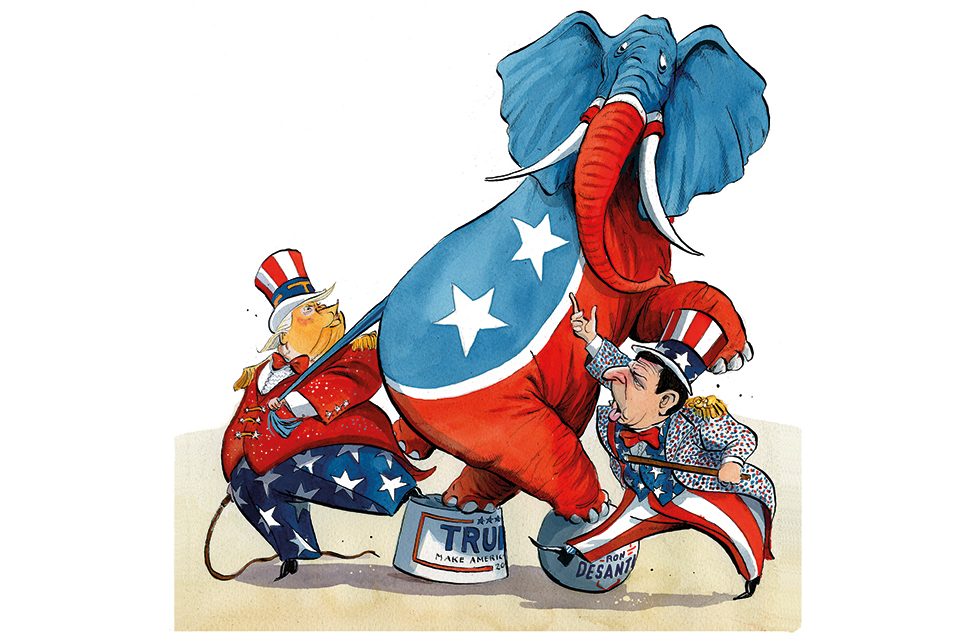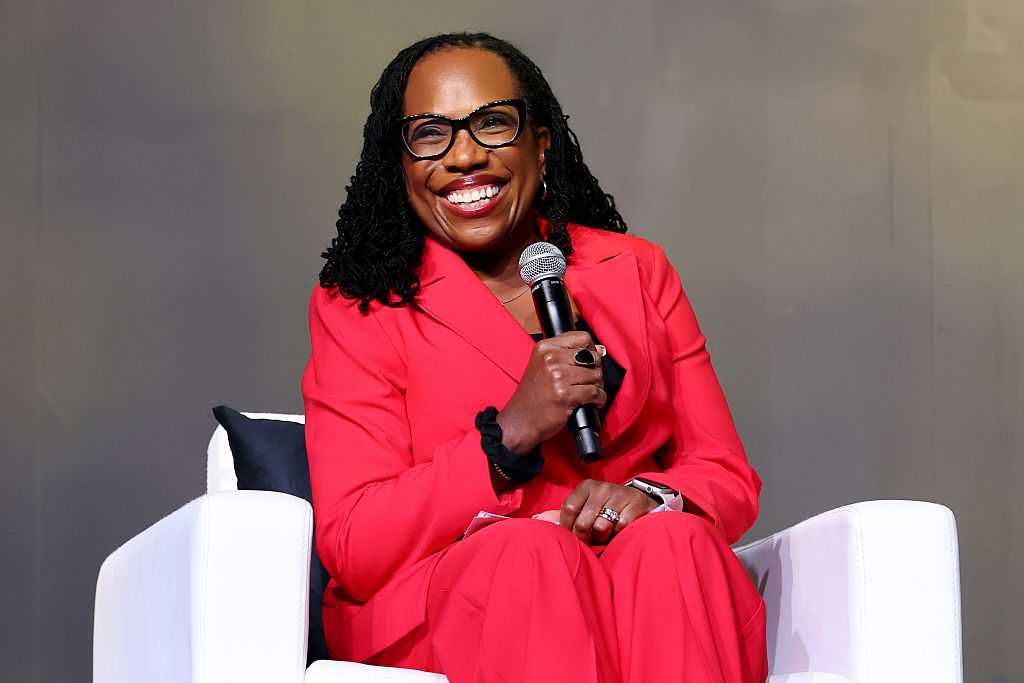It’s widely acknowledged that, as governor of Florida, Ron DeSantis has been a success. As a presidential candidate, however, he has been a disaster — at least, so far.
Last weekend, amid reports that his bid for the White House was floundering, DeSantis fired a dozen of his staff and scaled back his travel plans. He may have raised some $20 million between April and June, but some of the biggest Republican donors, who flocked towards him at the end of last year, are starting to turn away. His campaign is now concerned about funds running out.
DeSantis disputes the “doom and gloom” characterizations of his candidacy. When a politician starts complaining about the media’s “predetermined narratives,” however, the real message is clear: he knows he’s losing. The polls tell the story: in March, DeSantis was only around ten percentage points behind the inevitable frontrunner for the Republican nomination, Donald J. Trump. Today the gap is more than thirty points (Trump is on 52 percent, at least; DeSantis is dipping below 20).
Trump is relishing his adversary’s slide, naturally. “DeSanctimonious is a terrible candidate,” he declared last weekend, in that glee-dressed-as-regret tone he so often deploys when discussing his failing rivals. “I think he’s out.”
Where did it all go wrong for Ron? After the midterms in November, DeSantis was widely tipped to be the man to stop Trump winning the nomination again. He had won re-election in Florida, historically a closely contested swing state, by a staggering twenty points. He was Trump-like in his politics but more professional, less toxic — not crazy. Trump is seventy-seven, so the relative youth of forty-four-year-old DeSantis seemed another point in his favor, especially as America grapples with the fact that Joe Biden, its 80-year-old president, is not in full control of his faculties. “DeSantis is Trump, but you get two terms,” said one Republican consultant.
Inspired by such logic, various billionaires, the would-be kingmakers of the American right, began throwing huge sums in DeSantis’s direction. Rupert Murdoch liked him, which meant Fox News, the nation’s most powerful media network, started boosting his credentials. Murdoch’s New York Post called him “DeFuture” on its cover page alongside a Kennedy-esque photograph of Ron, his photogenic wife Casey and their neatly dressed little children.
This was all something of a “sugar high,” as DeSantis admitted at the weekend. (“Welcome back to reality!” snapped the Trump campaign’s official “War Room” account on Twitter.) It’s clear now that, as one Trump campaign insider puts it, “there was a lot of wishful thinking that we were moving into a post-Trump era. But Trump has long had a solid 35 percent of Republican support and it was always going to be difficult for anyone to get past that.”
Still, until at least late May, DeSantis’s backers could credibly argue that he had a reasonable chance. Yes, Republican voters clearly preferred Trump, but it was early days and, historically, frontrunners for the party’s nomination have tended to fade away as the primary season warms up — look at the now almost forgotten campaigns of Scott Walker in 2016, Newt Gingrich in 2012 or Rudy Giuliani in 2008.
DeSantis hadn’t even announced he was running, yet he commanded between 20 and 30 percent support in many Republican polls. As soon as he did declare, it was said, the political momentum — the “big mo,” as George H.W. Bush called it — would push him on. One of the world’s richest men, Elon Musk, appeared to have jumped on board too. He arranged for DeSantis to launch his candidacy alongside him in a great whizz-bang “Twitter Spaces” stunt on May 24.
Unfortunately, that sort of online campaign hype has an unpleasant habit of blowing up in a candidate’s face. Inevitably, the Twitter Spaces launch was a calamity. For the first ten minutes, the sound kept cutting out. Even once the technicians got DeSantis’s voice working, his audio feed was embarrassingly intermittent. DeSantis managed to deliver a barrel-load of platitudes about how “democratic society needs robust debates.” Then he droned on about his achievements as governor. It wasn’t just awful. It was hilariously dull — and that, it turns out, is DeSantis’s biggest problem.
“Personality and charisma are important in politics,” says a Trump insider. “Ron DeSantis speaks as though he is at some think tank luncheon. The question comes down to: do you want boring Trump? And the answer is no. People will always choose the candy bar over the spinach.”
DeSantis, an introvert, sounds like an automaton and becomes most robotic when trying to convey passion. Last weekend, during an interview with the former Fox News host Tucker Carlson in Iowa, he boldly predicted that he would triumph in a contest for the White House against California’s governor Gavin Newsom, the man many expect to replace the ailing Biden on the Democratic ticket next year.

“I’m very confident that the freedom in Florida is what more people would choose rather than the public defecation on the streets of San Francisco,” he said. You can imagine his team chortling at the line in rehearsal. But the words came out awkwardly. He also said that under his leadership Mexican criminals bringing fentanyl across the border are “going to end up stone-cold dead.” It sounded forced, even psychotic.
“His campaign is run by dorks for dorks,” says the Trump insider, and it’s easy to see his point. Murdoch, for one, has reportedly gone off him. According to reports, he “has privately winced” at DeSantis’s “anti-woke” messaging. Fox News has duly started making more critical noises about DeSantis. The editorial board of Murdoch’s Wall Street Journal has not rushed to his defense.
Americans like to compare political campaigns to businesses: the candidate is the product and if the product is flawed, the campaign will fail. That’s DeSantis’s problem: people aren’t buying him as president.
He tries to evade the “Boring Trump” label by outflanking Donald to the right. He has conspicuously courted liberal hostility by adopting a more conservative position on abortion, for instance, and making skeptical noises about the efficacy of the Covid vaccine. In doing so, however, DeSantis finds himself speaking to a “conservative movement” which, while still significant and well-funded, lacks the kind of mass appeal that Trump inspires.
DeSantis can prove the courage of his convictions by signing a bill banning “fetal heartbeat” abortions. But even in the more God-fearing parts of America, celebrity tends to trump religion and consumerism trumps everything, so Trump trumps all. Trump is a world-famous brand. In Bellville, Texas, “Trump Burger” is a popular fast-food restaurant. There are successful Trump merchandise stores in many parts of America. In other words, Trump the product sells.

Besides, if right-wing radicalism is what voters want, Trump’s promise that “I will be your retribution” in 2024 is surely more enticing than DeSantis’s hammy talk about Florida being the state where “woke goes to die.”
None of this is to say that DeSantis can’t win. If Trump goes to jail — and he could — Republican voters might reconsider their support (equally, they might not). DeSantis, a master of detail, may end up thriving in the debates. He may end up doing better than polls currently suggest in Iowa, the first state in the Republican nomination process, on January 15. Iowans voted for Ted Cruz over Trump in the 2016 caucuses.
But 2024 is fast approaching, Trump’s support is now more entrenched, and Ron’s time is running out. Those fickle donors are turning their attentions to Tim Scott, the African-American senator for South Carolina. There’s also renewed buzz around Vivek Ramaswamy, the energetic businessman turned candidate who speaks winningly about America’s “spiritual crisis.” Meanwhile, Nikki Haley, Trump’s former ambassador to the United Nations, and Mike Pence, Trump’s vice president, are still sucking up votes that might otherwise go to DeSantis.
It’s precisely the scenario anti-Trump Republicans have long feared: 2024 as a rehash of 2016, when a plethora of candidates all tripped over each other trying and failing to block the Orange One. “DeSantis has failed to clear the field,” says one political adviser. “Now he finds the field is catching him.” If that happens, Ron may well find himself remembered as another Scott Walker, a promising governor whose career was cut short by a failed tilt at the White House. He was DeFuture once.
This article was originally published in The Spectator’s UK magazine. Subscribe to the World edition here.

























